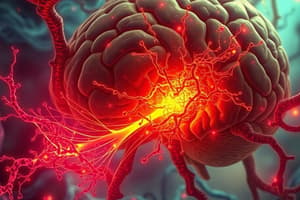Podcast
Questions and Answers
What is the difference between hazard and risk?
What is the difference between hazard and risk?
- Hazard and risk are not mentioned in the text.
- Hazard is the ability of a chemical agent to cause injury, while risk is the potential for an undesirable effect to occur. (correct)
- Hazard is the expected frequency of an undesirable effect, while risk is the ability of a chemical agent to cause injury.
- Hazard and risk are the same thing.
Which type of toxicology studies the toxic effects on populations and communities in defined ecosystems?
Which type of toxicology studies the toxic effects on populations and communities in defined ecosystems?
- Occupational toxicology
- Environmental toxicology
- None of the above
- Ecotoxicology (correct)
What is bioaccumulation?
What is bioaccumulation?
- The process by which a long-lasting contaminant exceeds an organism's ability to metabolize or excrete the substance (correct)
- The process by which a contaminant enters the body through inhalation.
- The process by which a contaminant magnifies as it passes up the food chain.
- The process by which a contaminant enters the body through ingestion.
What is biomagnification?
What is biomagnification?
Which route of exposure is the major route in industrial settings?
Which route of exposure is the major route in industrial settings?
What are halogenated aliphatic hydrocarbons known to cause in laboratory animals?
What are halogenated aliphatic hydrocarbons known to cause in laboratory animals?
Which air pollutants have clinical effects and treatments?
Which air pollutants have clinical effects and treatments?
Flashcards are hidden until you start studying
Study Notes
- Occupational toxicology identifies harmful agents and their effects on acute and chronic diseases.
- Environmental toxicology deals with the impact of pollutants on living organisms.
- Ecotoxicology studies the toxic effects on populations and communities in defined ecosystems.
- Hazard is the ability of a chemical agent to cause injury, while risk is the expected frequency of an undesirable effect.
- Routes of exposure differ in different situations, with inhalation being the major route in industrial settings.
- Toxic reactions may differ depending on the duration of exposure.
- Bioaccumulation occurs when a long-lasting contaminant exceeds an organism's ability to metabolize or excrete the substance.
- Biomagnification magnifies the concentration of a contaminant as it passes up the food chain.
- Specific air pollutants, such as carbon monoxide, sulfur dioxide, nitrogen dioxide, and ozone, have clinical effects and treatments.
- Halogenated aliphatic hydrocarbons, such as carbon tetrachloride, cause CNS depression, liver and kidney injury, and cardiotoxicity in laboratory animals.
Studying That Suits You
Use AI to generate personalized quizzes and flashcards to suit your learning preferences.




